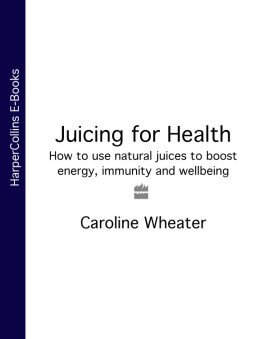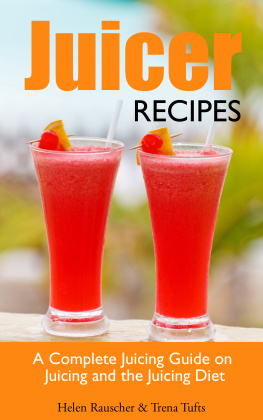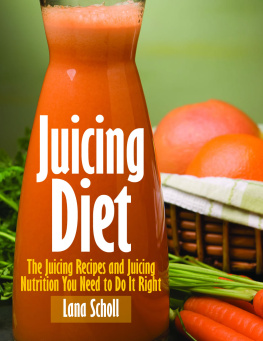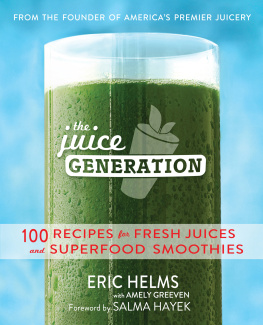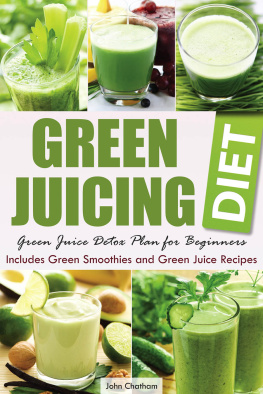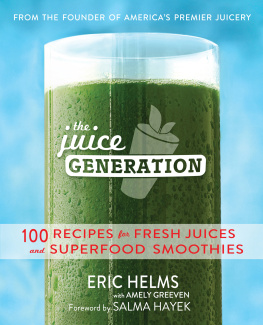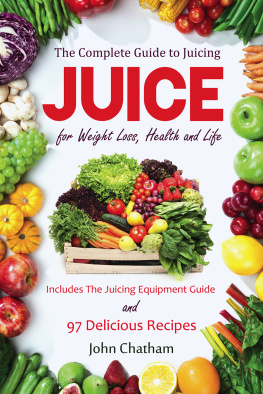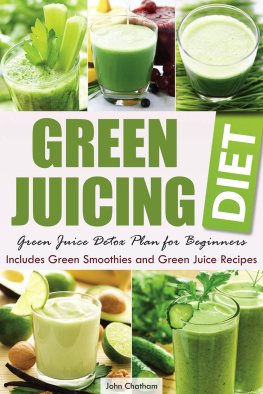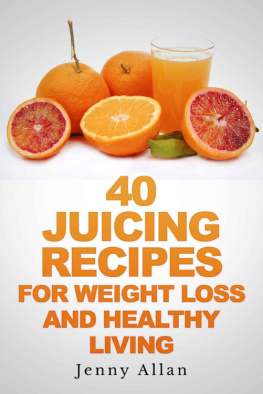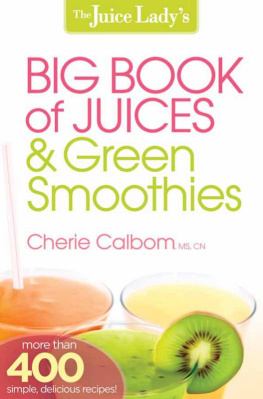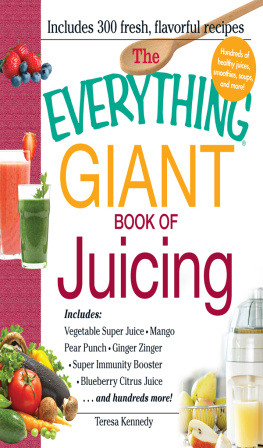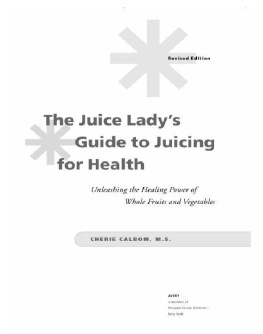The Fresh Facts Every time I sip a fresh fruit or vegetable juice, Im amazed by the flavour, the colour, the texture. To me, fresh juices are everything a healthy food should be: all-natural, bursting with taste, and choc-full of good things, from vitamins and minerals to enzymes and inner cleansers. It was back in 1992 that I first came across the health phenomenon that has since swept Europe, the States and Australia. A young woman named Sarah Zebaida had been so impressed with the fresh juices shed come across while travelling in Asia that shed opened Britains first ever juice bar Squeeze Us at the Pineapple Dance Studios in central London. It was a revelation. Just a few sips of her myriad blends and I was hooked the fruitiest fruit juices; the zestiest vegetable juices; rich smoothies that were just as filling as a light lunch.
Since then, of course, theres been no looking back and juice bars everywhere are doing a roaring trade. Of course, you dont have to go out to benefit from this healthiest of trends; juices are easy to make at home. All you need is a juicer and a shopping list full of your favourite fruits and vegetables. Juicing is surprisingly quick and immensely satisfying to do and can be done all year round as you make use of seasonal varieties. Root vegetable juices can be just as tasty as fruity ones and if you dont believe me, pop a parsnip in to juice or a carrot or a tomato. Smoothies are the ultimate in comfort juices, drink one just before going to bed for a solid nights sleep.
In short, freshly juiced juices are sweeter, more piquant, more tart, more creamy, more flavoursome, more varied than anything you might ever have tasted before. And because the fruits and vegetables you choose to use go straight from your shopping basket into your juicer and into you, youll get maximum benefit from their rainbow coalition of vitamins and minerals. Bearing in mind that the latest healthy eating advice is to consume at least five portions of fruit and vegetables a day, juicing makes perfect sense. It wont of course provide you with all-important fibre (thats why you need to eat whole fruit and vegetables too) but it will ensure youre getting a wide range of vital nutrients. Investing a little extra time and money brings huge dividends to your wellbeing. Which is why juicing is a habit that deserves to be got.
In my comprehensive guide, youll find out why fresh juices really are so special and how to go about making them. Not to mention hundreds of recipes for health, beauty and vitality, a detox plan, recipes for left-over pulp, and easy-to-understand nutritional notes about each fruit and vegetable included. As I discovered all those years ago, tasting is believing so why not try juicing for yourself.
With the fast pace of modern life, its easy to get caught up in the clutches of convenience, and to forget the simple and natural things in life. While were all aware of the benefits, eating fresh food is something thats often pushed to the bottom of our priority list. We make time to see friends, play sport and clean the house, but when it comes to supplying energy and nutrition through the best sorts of food its usually another story.
Lately we have become used to supplementing our diets with vitamin and mineral pills, as a kind of insurance policy. Supplements have their place and can be very effective, but they cant take the place of a diet full of natural, health-giving foods. Fresh fruit and vegetable juices are part of the all-natural line-up that can knock spots off convenience products. Not only do they provide a wealth of vitamins, minerals and other nutrients, they are also cleansing and balancing for the body as a whole; the equivalent of a multivitamin pill in a glass, with hidden benefits. RAW HEALTH Once you have tasted your own fresh fruit and vegetable juices youll realize that there is little comparison between the liquid that flows from your juicer and that which flows from shop-bought cartons. Most readymade juices rely on concentrated juice and extra water to bulk them up.
Look on the label and youll find that some juices contain additives such as sugar, colours, flavours and preservatives too, while the latest range of freshly juiced juices are wildly expensive. Homemade juices have nothing added, nothing taken away, just 100 per cent pure juice. The fruits and vegetables which you choose to juice will be as fresh as possible and will not have undergone any processing. This makes a real difference, as any sort of cooking reduces the content of vitamins and minerals, and sometimes destroys them altogether. Every time you drink a glass of juice it will contain virtually the same amount of nutrients (although not as much fibre) as if you were eating the fruit or vegetable whole. In fact, you will probably be absorbing far more, as it takes quite a bit of produce to make just one 8 fl oz/230ml glass of juice.
For example, you would have to eat 2 apples, or 3 carrots, or nearly a whole pineapple to consume the quantity of nutrients that goes into 8fl oz/230ml of juice. THE PIONEERS Of course, like most novel ideas, the concept of juicing is not new at all. Since the nineteenth century, doctors and naturopaths have been treating patients with fresh juices and raw foods to help improve their health. Germany and Switzerland are together regarded as the cradle of the therapy, and during the nineteenth and early part of the twentieth centuries nurtured a number of famous pioneers, such as Father Kniepp, Dr Kellog, Dr Max Bircher-Benner and Dr Max Gerson. Between them they developed the Rhsaft Kur (the fresh juice cure), which is still practised today at health clinics all over the world. American pioneers, such as the late Dr Norman Walker, and Ann Wigmore, founder of the Hippocrates Health Institute in Boston, have continued their work.
There is simply masses of research and practice to draw upon. For many years, therefore, juices have been used by naturopaths in Europe and America to help treat a whole range of minor, and sometimes major, ailments. Its no surprise when you consider what a rich source of nutrients and cleansing elements they are. VITAMINS AND MINERALS Fresh juices are packed with many of the vitamins and minerals that keep us well. As with all natural, whole foods, the vitamins and minerals in fruit and vegetables are often bound on to other nutrients that help absorption. For example, bioflavonoids are found in the pith of citrus fruit, and they aid the absorption of vitamin C.
The minerals found in fresh produce are chelated to amino acids, or sometimes a vitamin, to make them easier to absorb. The list below reveals the range of vitamins and minerals in fresh juices; beta carotene, vitamin C, potassium and phosphorus are found at particularly high levels. Vitamins beta-carotene (the vegetarian form of vitamin A) vitamin B1 (thiamine) vitamin B2 (riboflavin) vitamin B3 (niacin) vitamin B5 (pantothenic acid) vitamin B6 (pyridoxine) folic acid biotin choline inositol vitamin C vitamin E Minerals calcium chlorine chromium cobalt copper fluorine iodine iron magnesium manganese phosphorus potassium selenium sodium sulphur zinc For more information on the nutrients contained in fresh juices, see . THE ANTIOXIDANTS You may have heard of antioxidant nutrients in newspaper and magazine reports, and if you havent you will soon. They are the focus of scores of research studies, which are looking at whether a group of vitamins and minerals particularly vitamins A, C, E and selenium can give protection against degenerative diseases such as cancer, heart disease, premature ageing and cataracts. Scientists believe that they may be the key to limiting the impact of these often devastating diseases.

